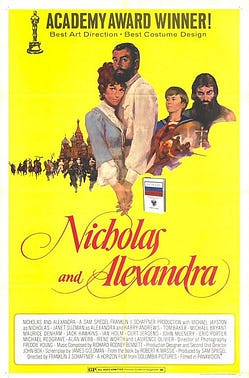I just watched Nicholas and Alexandra (1971), which tells the story of the fall of the Romanovs. The film did not do well financially, although it deserved to as the breath, depth, themes, dialogue, acting and cinematography were excellent. I had a very heavy feeling watching it, as one knows it ends in tragedy, so getting to know the Romanov clan before their fall was sad. It is an excellent movie, although long (3 hours) and paced like an older film (i.e. harder to sit through for eviscerated modern attention spans). The acting was universally strong, with Michael Jayston as Tsar Nicholas - the unbelievable emotions he conveyed with his eyes - and Tom Baker as Rasputin - with his raw magnetism - especially memorable.
The film defies easy categorization; it’s not necessarily a “dissident” film, although it shows the nobility of the 300 year Romanov dynasty, but neither is it pro-democracy. It conveys the basic fact that Russia was too slow to modernize even though the rest of the world was modernizing, so it was easily targeted for victimization. It had lost war with the Japanese and it was ill-equipped to fight war with Europe, and the Orthodox Church sought to undermine the authority of the Tsar and played a major role in the riots against him, considering him competition. The Romanovs were also targeted for destruction by the Rothschilds and their allies in Britain as covered here (neofeudalreview.substac… ), and Nicholas did not understand the extremely evil forces he was up against.
As Stolypin understood so insightfully, the Tsar’s only path forward for survival was to remain both autocratic to clamp down on the leftist radicals while shepherding Russia forward technologically, sort of like a Lee Kuan Yew with Singapore - and Stolypin offered that route by promoting land/farm reform until the Tsar ignored him and Stolypin was assassinated (as covered here: neofeudalreview.substac… ). Lenin himself understood so cleverly how Stolypin’s path was the Tsar’s only chance for survival. Russia also needed a permanent alliance with Germany in line with Mackinder’s thesis (which stated only a German/Russian alliance could stop U.K./U.S. domination) and to consider the U.K./U.S. as a permanent Satan incarnate with France their lackey, at least until their Rothschild central bank control was ended. Various plots against the Tsar were initiated by the British ambassador in Russia, who should have been expelled permanently.
Of course, the Tsar’s personality contributed to his dynasty’s decline, which I see astrologically: substack.com/@neofeudal…He also had bad luck by having four girls before his son, who had a severe blood disorder, and a domineering, emotional wife who also didn’t understand the forces laid against them - these factors also contributed to the fall.
Now, there are certain aspects of the film that whitewash unpleasant aspects of Russia’s history, specifically how Jewish the revolutionaries were (including Lenin, Stolypin’s assassin, and the assassin of the Tsar’s family Yakov Yurovsky), and how the Rothschilds/Schiffs from on-high barred entry of the Romanovs into England and France and ordered them executed. That was expected.
Ultimately, the film is best seen, imo, as a message that mankind is enslaved to this Pandora’s box of technical progress that has been unleashed - any country that did not advance it would fall to others that would. It is a blind, frenetic race with no end in sight other than further technical control - and if leaders don’t embrace it they will fall to it.
This is why this world is a Demiurgic hell.
10/10.


